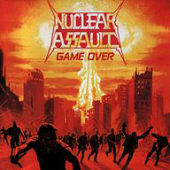Nuclear Assault - Official Website
Game Over |
United States
 |
|---|

Review by Dominik on April 15, 2025.
After finishing up my review of Nuklear Goat—don’t ask—I figured I might as well stick to the nuclear theme, keep the atomic hangover going, and dive into a true classic. Which of course makes it a straight shot into the arms of Nuclear Assault. The album at hand, “Game Over”, is another 1986 thrash gem—but also as far as I’m concerned, their best and last real moment of clarity before the Geiger counter-flatlined. You see, there’s a strange kind of dementia that seems to affect anyone who’s ever played in Anthrax and then left. A kind of musical amnesia that strikes shortly after recording one—maybe two—decent albums before the ability to write a good riff, song, or even album mysteriously vanishes like integrity at a major label artist and producer meeting, a place where authentic ideas get watered down for the sake of sales. It happened to Anthrax, and it happened to the orbiting acts as well. So yes, “Game Over” may be Nuclear Assault’s debut, but it also doubles as their creative peak. The rest? Anything that followed knew only one direction. Which makes it all the more poetic, even prophetic, that one of the album’s standout tracks is called “Stranded in Hell”.
But back to the beginning. I still remember the first time “Game Over” hit the turntable. My best metal buddy slapped it on, and suddenly sonic chaos met precision. This release captures something unique: a band which is balancing wild, sometimes punk-like chaos with surprisingly tight musicianship. All wrapped in a production that isn't polished, but there is a clarity to the riffs that probably foreshadows the band's more technical later work.
What really caught me off guard was the hardcore influence. Here we had some tracks that were almost like hardcore songs dressed in thrash gear, and the irony wasn’t lost on me: my metal buddy at the time treated punk and hardcore like a contagious disease. I thought he'd finally converted. He hadn’t. But “Game Over” managed to make him admit, grudgingly, that hardcore energy had a place in the metal ecosystem—at least for 36 minutes.
And then there’s guitarist and frontman John Connelly. His vocal approach is, for lack of a better word, almost anti-charismatic on purpose. He doesn’t croon, doesn’t roar—he just yells. Urgent, nasal, angry, and sometimes full of anxiety and frustration, like someone who’s been awake for 72 hours watching the world end on TV. And that’s exactly why it works. All the great thrash albums of the ‘80s had vocalists who gave the music its unique identity—and Connelly, like it or not, carved his name into that list with a rusty screwdriver.
“Game Over” brings the full apocalyptic package. Besides the aural assault, the album also visually exuded an “end of the world” energy. Another iconic, grotesquely brilliant Ed Repka cover, in combination with the raw production, the anxious pacing, and frantic drumming, gives “Game Over” a Cold War paranoia vibe that's more visceral than intellectual. There’s no epic storytelling, no dragons or spaceships—just the creeping suspicion that we’re all one button away from ash. The title is fatalistic, the cover chaotic, conveying full-scale panic excellently. It doesn't just talk about nuclear war – it feels like it was recorded in a fallout shelter during the apocalypse. Yet even amid all the doomsaying, there’s a pulse of dark humor, which I like a lot. The band, despite the seriousness of themes and their aggressive delivery, sometimes uses humor as a pointed form of critique. “Hang the Pope” might be the most obvious example—it’s short, violent, absurd, and probably confused the hell out of anyone expecting serious political analysis.
Musically, the album offers more than just a sonic battering. The record hosts one of the few instrumentals that truly rip, and which actually feels necessary. “Live, Suffer, Die” is a brutal, compact thesis statement. You’re born in pain, you suffer, and you die. That’s the mood. That’s the sound. “Radiation Sickness” stands out with its deranged chorus and the fact that Dan Lilker’s bass isn’t buried—it’s dirty and present, often adding extra bite to the guitar tone. And “Vengeance”? A whirlwind of solos, and moments where Connelly injects a bit more variety into his pitch, showing he could push the limits when he wanted. And yes, I loved “Hang the Pope” to death. Always did. Even if it did feel like Lilker brought it over in his S.O.D. lunchbox. It’s not a clone, but it certainly smelled like family.
Ultimately, what makes “Game Over” endure isn’t just its aggression or its technical skill—it’s the reckless sincerity. The album doesn’t try to be timeless, and maybe that’s why it is. In a way, it sounds like Nuclear Assault didn't know if they’ll get a chance to record another album, so they crammed everything into this one: anger, speed, sarcasm, and a healthy dose of “fuck it”.
Rating: 9/10, because this album didn’t just soundtrack a generation’s nuclear anxiety—it sounded like a band detonating their own frustrations before anyone else could.
NB: my album version is part of the 2011 re-issue which includes the “The Plague” EP and some live songs which are both not part of this review.
Rating: 9 out of 10
1.09k